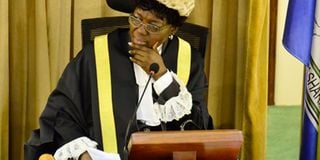I am no devil worshipper – Kadaga

Speaker of Parliament Rebecca Kadaga. Photo by Dominic Bukenya
What you need to know:
Reason. Ms Kadaga says she went to Nhyenda Hill in Nakigo Sub-county in Iganga District to inform her ancestors of her triumph in retaining the post of Speaker of Parliament.
KAMPALA. The Speaker of Parliament, Ms Rebecca Kadaga, has denied accusations that she practices syncretism and devil worshipping.
“I have been severally accused of practicing witchcraft, worshipping evil spirits, syncretism… Nothing could be further from truth,” Ms Kadaga wrote in a statement sent to the Daily Monitor on Friday afternoon.
The statement was precipitated by reactions to a video that showed her visiting the cultural site on Nhyenda Hill in Nakigo Sub-county in Iganga District.
After the visit, she said on camera that she had gone there to inform her ancestors of her triumph in retaining the post of Speaker of Parliament.
After the video went viral with sections of society accusing her of practicing witchcraft, Ms Kadaga later said she was promoting cultural tourism.
However, last Thursday, the Archbishop of the Church of Uganda, Stanley Ntagali, said the Speaker’s paying homage to her ancestors to whom she attributed her victory was “confusing” for a leader of her calibre and “it might cause others to stumble”.
With this latest criticism from the Church of Uganda, the Speaker penned a defence.
“I do not think that those who practice witchcraft or indulge in acts of devil worshipping would do so in broad daylight and under the full glare of television and still cameras. I also don’t think they would go to do so in the company of such big numbers of people as I was on the said day,” she added.
Ms Kadaga explained that her father, the late Wilson Madani Kadaga, had been a preacher in the Church of Uganda and that he had also built a church in Kiige village in Balawoli Sub-county in Kamuli District.
She said three close family members: Rev Nelson Kisambira, Rev Andrew Kisubi and Rev Nantamu are priests in the Church of Uganda.
The Speaker, however, hastened to add that despite such a Christian- leaning and standing, she recognises that she is a Musoga and is proud of her culture.
Ms Kadaga wondered why her visit to her ancestry is causing an uproar. “I know that clans in neighbouring Buganda often make pilgrimages to the biggwas (shrines) of their clans. Not once have I heard anyone condemning them for celebrating their ancestry or culture. I find it intriguing if not extremely interesting that I am being singled out for criticism for doing what all others do,” she said.
Ms Kadaga says her position as a Member of Parliament and Speaker of the Legislature do not make her less of a Musoga or a Ugandan.
Statement by parliament speaker Kadaga on her visit to a shrine
The media has for the last one week been awash with various comments about the events of Saturday, May 21, when I visited Nhyenda Hill in Nakigo Sub-county in Iganga District.
I have been severally accused of practicing witchcraft, worshipping evil spirits, syncretism etc. Nothing could be further from truth.
I do not think that those who practice witchcraft or indulge in acts of devil worshipping would do so in broad daylight and under the full glare of television and still cameras. I also don’t think they would go to do so in the company of such big numbers of people as I was on the said day.
I am a Christian. I was born and raised in a Christian family. My father was a preacher in the Church of Uganda and even built a Church in Kiige, in Balawoli Sub-county in Kamuli District.
Three close family members: Rev Nelson Kisambira, Rev Andrew Kisubi and Rev Nantamu are priests in the Church of Uganda.
I have never stopped being a Christian, but like any other Ugandan, I have a cultural Identity which I am proud of.
I am also very proud to be a Musoga. Those who attended the swearing in last week might remember that I took oath using a Lusoga version of the Holy Bible. That is testimony that I am proud of my origins.
Much as I am a Christian, I do have a culture in the same way that the English, Spaniards, Scots, the French, the Luo, the Baganda, the Bagwere or those from Ankole who practice Anglicanism or Catholicism do.
As a people, the Basoga speak different dialects. The dialects are defined along the lines of the 11 hereditary chiefdoms of Busoga i.e. Bugabula, Butembe, Bunhya, Bukono, Busiki, Bunhyoli, Bulamogi, Kigulu, Bugweri, Luuka and Bukooli.
We have at least 147 known clans and each clan has a Muziro (totem), a Mubala (tag line) and enkuni, what the people in neighbouring Buganda refer to as “ekiggwa ky’ekika” (cornerstone or foundation of the clan).
In Busoga the name of the clan is preceded by the term “Baise” or “Mwise” which means “those whose father is…”. I belong to the Baise Igaga Clan or a clan whose father is Igaga.
We the Baise Igaga associate our lineage to our patriarch Igaga Byaruhanga Nantamu who is believed to have migrated from the Kingdom of Bunyoro Kitara after finding himself on the losing side in a succession war for the Obukama. Why he chose to come to Busoga is still the subject of research, but he together with his wife, Buwalaki, arrived at Kabira village, near Nhyenda Hill around 1350 and made it their home.
A few months after their arrival, the matriarch, who was pregnant, informed her husband in Lusoga that the baby was due.
“Nhyenda Kuzaala”. This was their first child and the husband took his wife in a nearby bush where she delivered. Because the wife used the word Nhyenda he named the hill Nhyenda and because the baby had been delivered in a bush, he named him “Kisubi”. The hill has since been the foundation (enkuni) upon which more generations have emerged to expand the clan to its current size.
It is not only amongst the Baise Igaga that this hill is of great significance. The town and the rest of the district derive their name from the first owner of the hill, Igaga, whose name the colonial administrators found too hard to pronounce and changed it to “Iganga”.
It is also an important feature in the Busoga tourism circuit. Nhyenda Hill is along with the Bishop Hannington Memorial Site in Kyando in Mayuge and Kagulu Hill in Buyende one of the 33 cultural sites of Busoga.
On top of this hill is a throne hewed from stones on which our patriarch used to sit while in council with his officials and the Uganda Agreement of 1890 was negotiated and signed on Nhyenda Hill, with the active participation of one of our ancestors, Walinda Munuulo.
President Yoweri Museveni had been due to officially launch Nhyenda Hill as one of the tourism sites in Busoga, but the function was postponed due to the onsets of campaigns. That launch is now expected to be held later this year.
Back to matters culture, our clan is closely associated with or similar to that of abe Mbogo in Buganda. We share a totem, the Buffalo, and the smaller totem (akabbiro), any bananas (matooke) affected by bush fire (oluyiira). The only point of departure lies in tribe and location of foundation, theirs being located in Mugulu in Ssingo.
Different clans have different ways of either maintaining cohesion or celebrating either success or their ancestry.
Over the years we the Baise Igaga have been holding two annual meetings, one mandatory and another optional. The optional one is held in any of the 11 hereditary chiefdoms of Busoga. Determination of the venue is arrived at on a revolving basis.
The mandatory annual meeting must be held on Nhyenda Hill for purposes of celebrating our ancestry. This often involves praying for our ancestors, cleaning up the site and making merry.
All the clans in Busoga that I know of believe in life after death. They believe that the dead never really die and that they continue to live amongst us, at least in spirit. That explains why many of us periodically travel to our family or indeed the ancestral burial grounds to clean up, take flowers, pray for them and inform them of our successes, even tribulations. We the Baise Igaga are no exception.
May 21st happened to have been one such annual assembly day, but it also coincided with my having, two days earlier, been re-elected to the office of the Speaker. So besides the usual meeting with appointed leaders from each of the counties to discuss the rehabilitation work being carried out on the steps, the fence and the main building, it was also a time to share my success with my ancestors and clansmen and I do not comprehend how that is deemed to have contradicted my standing as a Christian.
We all know that members of the Royal Family in Buganda occasionally visit the Kasubi Tombs and other masiro in other parts of Buganda. Have I been missing the voices of condemnation?
I also know that there are those to whom the Uganda Martyrs are simply family members. I am sure they too visit the shrines in Namugongo not because they are martyrs, but because they are family/ancestors. Should we criticise them for paying tribute to their ancestors?
I know that clans in neighbouring Buganda often make pilgrimages to the Biggwas of their clans. Not once have I heard anyone condemning them for celebrating their ancestry or culture. I find it intriguing if not extremely interesting that I am being singled out for criticism for doing what all others do.
A friend recently told me that it is because I am a woman, an MP and the Speaker of Parliament. I hope that her comments were made in jest, but if not, I would like to remind everyone that being a woman, an MP and the Speaker of Parliament does not make me less of a Musoga or a Ugandan or extinguish my identity as a Mwise-Igaga.




